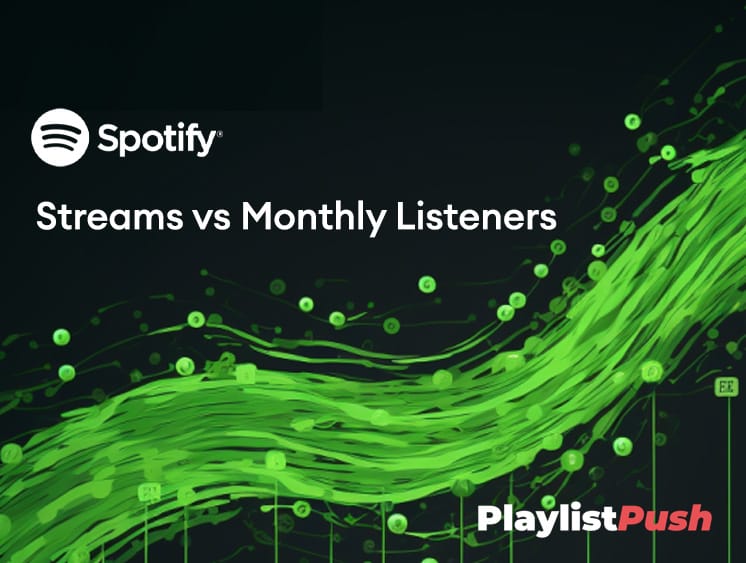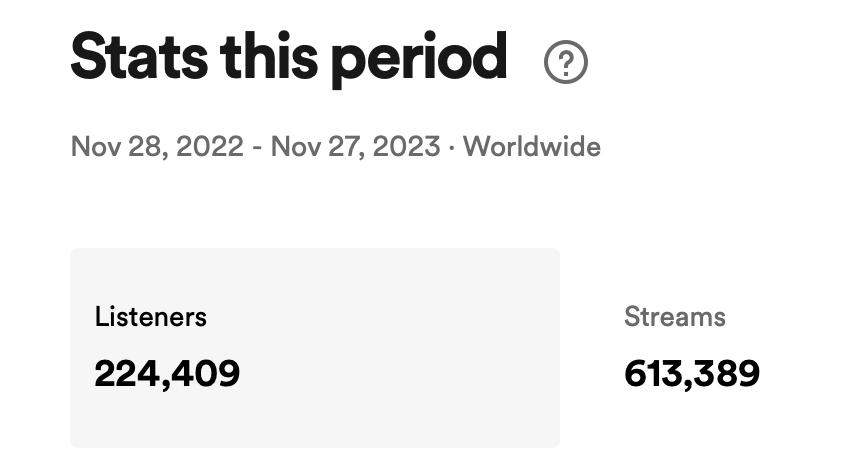Spotify Streams vs. Monthly Listeners: A Comparative Analysis

Discover the key differences between Spotify streams and monthly listeners in this insightful comparative analysis.
In the ever-evolving world of music streaming, artists and industry professionals alike have become acutely aware of the significance of metrics such as Spotify streams and monthly listeners. These metrics provide valuable insights into an artist's reach, popularity, and overall success on the platform. However, understanding the nuances of these metrics and their impact on artists can be complex.
In this article, we will delve into the world of Spotify streams and monthly listeners, analyzing their definitions, the metrics behind them, their impact on artists, and the value they bring to an artist's career. Booking agents and other music business professionals widely regard monthly listeners as your music biz credit score. It's a helpful metric for tracking sustained audiences and growth across all platforms.
Understanding Spotify Streams and Monthly Listeners

When it comes to understanding the popularity and reach of an artist's music on Spotify, two important metrics come into play: Spotify streams and monthly listeners. These metrics provide valuable insights into an artist's performance and fanbase. Let's delve deeper into what these terms mean and how they contribute to an artist's success on the platform.
Defining Spotify Streams
Let's begin by defining what exactly Spotify streams represent. In the context of Spotify, a stream refers to a single instance of a song being played. This includes both full plays as well as partial plays, as long as they meet the minimum requirement for a stream to be counted.
Each time a user listens to a song on Spotify, it is considered a stream. Whether it's a listener playing the song from start to finish or just enjoying a snippet of it, each instance contributes to the overall stream count. This means that even if a song is played for a few seconds, it still counts as a stream. However, it's important to note that there is a minimum duration requirement for a stream to be counted, ensuring that brief accidental plays are not included.
Spotify streams are a crucial metric for artists as they provide insights into the popularity and engagement of their music. The more streams an artist accumulates, the more it indicates that their music is resonating with listeners and gaining traction.
Defining Monthly Listeners
Now that we have a clear understanding of Spotify streams, let's move on to defining monthly listeners. Monthly listeners, on the other hand, represent the unique number of individuals who have listened to an artist's music within a given month. It provides a snapshot of an artist's overall listenership and fanbase during that period.
Unlike streams, which count every instance of a song being played, monthly listeners focus on the unique individuals who have engaged with an artist's music. This means that even if a listener plays an artist's songs multiple times within a month, they will only be counted as one monthly listener.
Monthly listeners are a significant metric for artists as they showcase the size and growth of their fanbase. It helps artists gauge their reach and popularity, providing valuable insights into their overall performance on Spotify. A higher number of monthly listeners indicates a wider audience and a stronger connection with fans.
It's important to note that both Spotify streams and monthly listeners play a crucial role in an artist's success on the platform. While streams highlight the popularity of individual songs, monthly listeners give a broader perspective on an artist's overall listenership and fanbase.
In conclusion, understanding Spotify streams and monthly listeners is essential for artists and music enthusiasts alike. These metrics provide valuable insights into an artist's reach, popularity, and engagement on the platform. By analyzing and tracking these metrics, artists can make informed decisions to further enhance their music and connect with their audience in a more meaningful way.
The Metrics Behind Spotify Streams and Monthly Listeners
When it comes to measuring success on Spotify, two key metrics stand out: streams and monthly listeners. These metrics provide valuable insights into an artist's popularity and the engagement of their fanbase. Let's take a closer look at how Spotify counts streams and determines monthly listeners.
How Spotify Counts Streams
Spotify employs a complex algorithm to accurately track and count streams. This algorithm takes into consideration various factors to ensure that only genuine and meaningful plays are counted toward an artist's total stream count.
One of the factors that Spotify considers is the duration of play. If a user listens to a song for a significant amount of time, it is more likely to be counted as a stream. This helps prevent short and incomplete plays from being included in the stream count.
In addition to duration, Spotify also takes into account skips. If a user skips a song within the first few seconds, it is less likely to be counted as a stream. This helps filter out accidental skips or instances where a user quickly moves on to another song without actually engaging with the music.
Furthermore, repeated plays are also taken into consideration. If a user listens to a song multiple times, it is counted as multiple streams. This reflects the level of engagement and interest in the music, providing a more accurate representation of an artist's popularity.
How Spotify Determines Monthly Listeners
Monthly listeners are another important metric that Spotify uses to gauge an artist's reach and audience engagement. This metric provides insights into the number of unique listeners who engage with an artist's music during a particular month.
Spotify constantly updates this data, ensuring that it reflects the most recent listener activity. By identifying and recording unique listeners, Spotify can accurately determine an artist's monthly listener count.
This metric is particularly valuable as it allows artists and their teams to monitor the growth of their fanbase over time. By comparing monthly listener counts across different periods, they can assess the effectiveness of their promotional efforts, identify trends, and make informed decisions regarding their music career.
Moreover, monthly listeners also provide insights into the level of audience engagement. Artists can analyze the number of listeners who return to their music month after month, indicating a loyal fanbase. This information can be used to tailor marketing strategies and create personalized experiences for their fans.
In conclusion, Spotify's algorithms for counting streams and determining monthly listeners play a crucial role in assessing an artist's success on the platform. These metrics provide valuable insights into an artist's popularity, fanbase growth, and audience engagement. You can look into Soundchart's music analytics services to get even more data about your career across the most important platforms and radios. By understanding how these metrics work, artists and their teams can make data-driven decisions to further their music careers.
The Impact of Spotify Streams on Artists
Revenue Generation from Streams
One of the most significant impacts of Spotify streams on artists is the potential for revenue generation. Artists receive royalties based on the number of streams their songs accumulate. As streams increase, so does the artist's revenue potential, making it a crucial metric for financial success.
When a song gains popularity and starts accumulating a high number of streams, it can become a significant source of income for the artist. The more streams a song receives, the more royalties the artist earns. This revenue can help support the artist's career, allowing them to invest in new equipment, hire a team, or fund future projects.
Moreover, the revenue generated from Spotify streams can provide artists with a stable income stream. Streaming royalties are ongoing unlike traditional album sales, where artists receive a lump sum upfront. As long as the song continues to be streamed, the artist will continue to earn revenue, creating a more sustainable financial model.
Artist Exposure and Discovery through Streams
Streams also play a vital role in artist exposure and discovery. As songs accumulate streams, they have the potential to be included in personalized playlists and algorithm-based recommendations, exposing the artist to new listeners and increasing their chances of discovery.
When a song is included in popular playlists, it reaches a wider audience, allowing the artist to gain new fans and followers. This exposure can lead to increased concert ticket sales, merchandise purchases, and even brand partnerships. In addition, being featured in algorithm-based recommendations can help artists reach listeners with similar music preferences, increasing the likelihood of building a dedicated fan base.
Furthermore, Spotify's algorithm takes into account various factors, such as the listener's location, listening history, and genre preferences, to curate personalized playlists. This means that artists can connect with listeners who are more likely to enjoy their music, increasing the chances of building a loyal fan base and fostering long-term success.
The Significance of Monthly Listeners for Artists
Audience Reach and Engagement
Monthly listeners offer insights into an artist's overall audience reach and engagement. A higher number of monthly listeners indicates a larger and more active fanbase, increasing an artist's potential for growth, collaborations, and live performances.
Listener Loyalty and Retention
Monthly listeners also provide insights into listener loyalty and retention. A consistent and growing monthly listener base indicates that an artist's music is resonating with their audience, fostering long-term relationships and increasing the likelihood of repeated listens and ongoing support.
Comparing the Value of Spotify Streams and Monthly Listeners
Which Metric Matters More for Artists?
While both Spotify streams and monthly listeners are crucial metrics, determining which one matters more for artists can be subjective. The significance of each metric may vary depending on an artist's goals, career stage, and specific circumstances. Nevertheless, understanding and tracking both metrics can provide a more comprehensive view of an artist's performance and progress.
The Role of These Metrics in Music Marketing
Both Spotify streams and monthly listeners play pivotal roles in music marketing strategies. They provide data-driven insights that help shape marketing campaigns, target specific audiences, and evaluate the effectiveness of promotional efforts. This data helps artists and their teams make informed decisions to maximize their reach and impact.
At Playlist Push we help artists with both streams and monthly listener growth. Each curator is different in how they manage their playlists, you could end up staying on some playlists for years which leads to both stream and monthly listener growth.
As the music industry continues to evolve, Spotify streams and monthly listeners have become indispensable metrics for artists seeking success and recognition. Understanding the definitions, metrics, impact, and value of these metrics is essential for artists and industry professionals to navigate the ever-changing landscape of music streaming platforms. By leveraging the insights provided by Spotify streams and monthly listeners, artists can strategically position themselves, connect with their audience, and ultimately thrive in the digital era of music.
Looking to Promote Your Music?
Use our Spotify Playlist Submissions or TikTok Promotion services.





